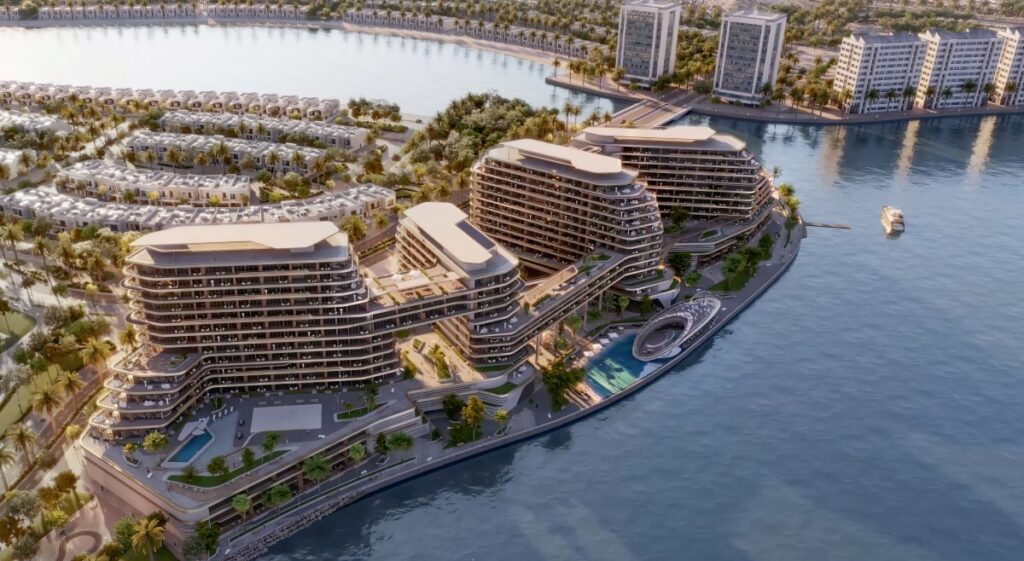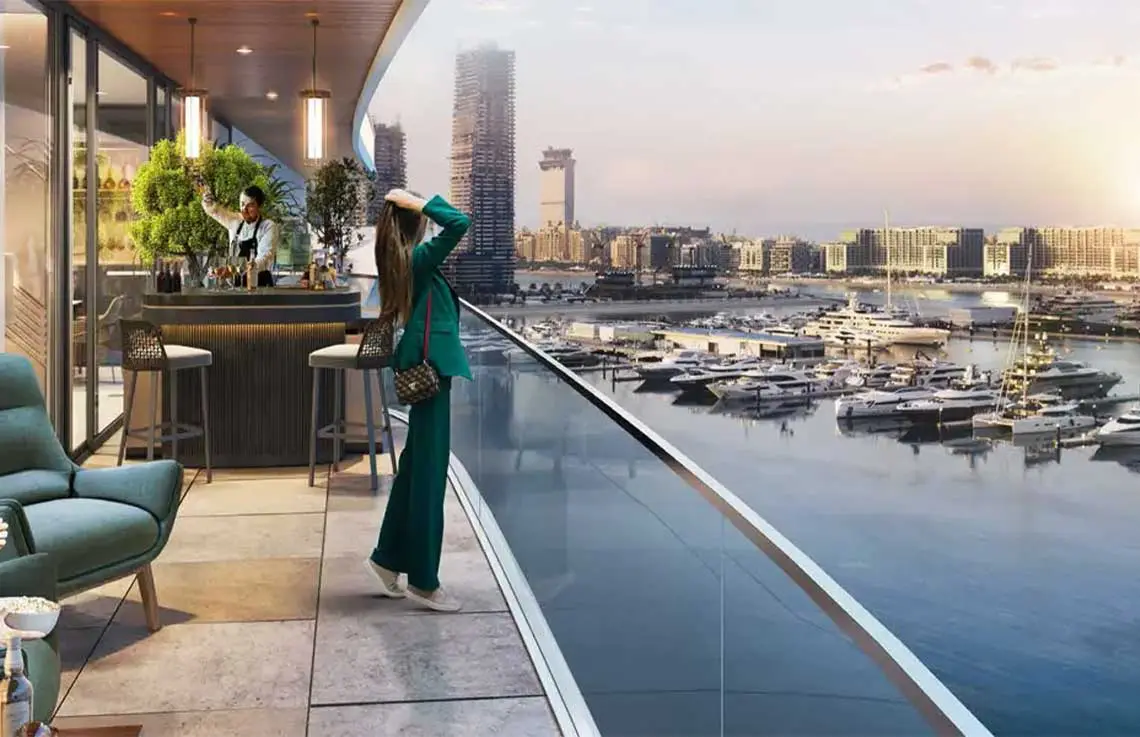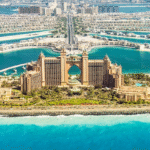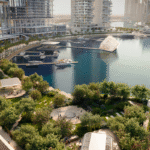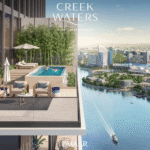Now Reading: Dubai Marina vs Palm Jumeirah: Where Lifestyle Meets Investment
-
01
Dubai Marina vs Palm Jumeirah: Where Lifestyle Meets Investment
Dubai Marina vs Palm Jumeirah: Where Lifestyle Meets Investment
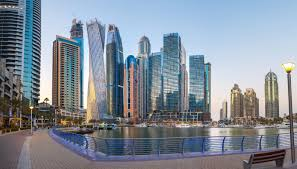
Table of Contents
Imagine waking to the gentle hum of yachts gliding through a marina or the soothing sound of waves lapping against your private beach, with Dubai’s skyline or the Burj Al Arab as your backdrop. In 2025, Dubai Marina and Palm Jumeirah stand as twin pillars of luxury and investment, driving a real estate market with 96,000 transactions worth $87 billion in the first half, 58% fueled by buyers from the UK, India, Russia, and China.
Offering 100% freehold ownership, a dirham pegged to the U.S. dollar, and no personal income tax, capital gains tax, or annual property taxes, these waterfront havens promise 6-9% rental yields and 8-15% price appreciation, outpacing London (2-4%) and New York (2-3%).
roperties over $545,000 qualify for a 10-year Golden Visa, while smaller units grant 2-year residency. Powered by 25 million tourists and a 4% population surge, Dubai Marina’s vibrant urban energy and Palm Jumeirah’s exclusive coastal serenity offer distinct lifestyles and investment potential. Navigating fees, VAT, and 2025 regulations is key to choosing your perfect haven.
Why Dubai Marina and Palm Jumeirah Are Investment Hotspots
Located 20-30 minutes from Dubai International Airport via Sheikh Zayed Road or water taxis, these areas boast vacancy rates of 2-3%, compared to 7-10% globally. You keep 100% of rental income $36,000-$150,000 annually on $600,000-$5 million properties versus $19,800-$90,000 elsewhere after taxes.
Zero capital gains tax saves $24,000-$300,000 on $120,000-$1.5 million profits, and no property taxes save $6,000-$50,000 yearly, unlike London’s council tax (up to 2%) or New York’s property tax (1-2%). Residential purchases skip 5% VAT ($30,000-$250,000), and the Golden Visa adds residency prestige. With private marinas in Dubai Marina and private beaches on Palm Jumeirah, these areas deliver 8-15% price growth, blending lifestyle allure with strong returns.
Choosing between them feels like picking your dream coastal lifestyle.
No Personal Income Tax: Rentals That Fuel Wealth
Both areas impose no personal income tax, letting you keep every dirham, unlike the U.S. (up to 37%) or UK (up to 45%). A $600,000 apartment in Dubai Marina yields $36,000-$54,000, saving $13,320-$24,300; a $5 million villa on Palm Jumeirah yields $120,000-$150,000, saving $54,000-$67,500.
Short-term rentals, driven by 25 million tourists visiting Dubai Marina Walk or Palm’s Atlantis, require a DTCM license ($408-$816), boosting yields by 10-20% ($3,600-$30,000). Long-term leases, popular with affluent expats seeking urban vibrancy or coastal exclusivity, need Ejari registration ($54-$136) for stability. Non-compliance risks fines up to $13,612, so licensing is essential. Smart home systems, like AI-driven lighting and climate control, enhance rental appeal, maximizing profits in these high-demand areas.
Tax-free rentals feel like a monthly tide of prosperity.
Zero Capital Gains Tax: Profits That Soar
Both areas offer zero capital gains tax, letting you keep 100% of sale profits. Selling a $600,000 apartment in Dubai Marina for $720,000 (20% appreciation) yields a $120,000 tax-free profit, saving $24,000-$33,600 versus London (20-28%) or New York (20-37%). A $5 million villa on Palm Jumeirah sold for $6.25 million delivers a $1.25 million tax-free gain, saving $250,000-$350,000. Price growth varies: 10-15% on Palm Jumeirah due to its iconic status, 8-12% in Dubai Marina for its urban appeal. A 4% DLD fee ($24,000-$200,000), often split, applies, but tax-free profits make these areas wealth-building coastal gems.
Keeping every dirham feels like a financial triumph.
No Annual Property Taxes: Ownership That Feels Light
Unlike global markets, these areas have no annual property taxes, saving $6,000-$50,000 yearly on $600,000-$5 million properties versus London’s council tax ($12,000-$100,000) or New York’s property tax (1-2%). Maintenance fees range from $8,000-$25,000, covering private marinas, wellness centers, and concierge services, competitive with global luxury markets. A 5% municipality fee on rentals ($1,800-$7,500) applies, reasonable for prime waterfront locations. These low costs make ownership sustainable, supporting a luxurious lifestyle that feels effortless.
No property taxes feel like a warm embrace for your investment.
VAT Rules: A Savvy Investor’s Edge
Residential purchases skip 5% VAT, saving $30,000-$250,000 on $600,000-$5 million properties, unlike commercial properties or the UK’s stamp duty (up to 12%, or $72,000-$600,000). Off-plan purchases, common in Dubai Marina, incur 5% VAT on developer fees ($6,000-$100,000), recoverable via Federal Tax Authority (FTA) registration ($500-$1,000).
Short-term rental operators must register for VAT if revenue exceeds $102,041, charging 5% but claiming credits on DTCM fees ($408-$816). A $600,000 apartment yielding $36,000-$54,000 incurs $1,800-$2,700 in VAT, with $600-$1,200 in credits; a $5 million villa yielding $120,000-$150,000 incurs $6,000-$7,500 in VAT, with $2,000-$3,000 in credits. Non-compliance risks fines up to $13,612, so meticulous records are crucial.
VAT exemptions feel like a clever boost to your profits.
DLD Fees and Title Deeds: Securing Your Coastal Sanctuary
The 4% DLD fee, typically split, applies: $24,000 for a $600,000 apartment or $200,000 for a $5 million villa. Gift transfers to family or shareholders reduce DLD to 0.125%, saving $23,250-$193,750. For example, gifting a $5 million villa cuts DLD from $200,000 to $6,250.
Title deed issuance costs $136-$272, requiring DLD registration. Broker fees, typically 2% ($12,000-$100,000), may be waived for off-plan projects like Dubai Marina’s Liv Lux. Mortgage registration (0.25% of the loan, or $1,500-$12,500) and valuation fees ($680-$1,360) apply for financed deals. The 2025 Oqood system ensures escrow compliance for off-plan purchases, protecting your investment.
Title deeds feel like the key to your luxurious haven.
Corporate Tax: A Business Buyer’s Note
The 9% corporate tax, introduced in 2023, applies to businesses with profits over $102,110. A company leasing a $600,000 apartment yielding $36,000-$54,000 faces a 9% tax ($3,240-$4,860), reducing net income to $32,760-$49,140. A $5 million villa yielding $120,000-$150,000 incurs $10,800-$13,500 in tax. Qualified Free Zone Person (QFZP) status in areas like Dubai Multi Commodities Centre (DMCC) avoids this, saving $6,120-$36,000, with setup costs of $2,000-$5,000. Small business relief waives corporate tax for revenues under $816,000 until December 31, 2026. Individual ownership skips this tax, ideal for most buyers seeking luxury.
Corporate tax feels like a wave you can easily navigate.
New Tax Rules for 2025
The Domestic Minimum Top-up Tax (DMTT), effective January 1, 2025, imposes a 15% tax on multinationals with revenues over €750 million ($793 million). Individual investors and smaller entities are unaffected, and QFZP status avoids DMTT, saving $6,120-$36,000. Cabinet Decision No. 34 refines Qualifying Investment Fund (QIF) rules, exempting corporate tax if real estate income is below 10%. A QIF earning $1 million, with $100,000 from rentals, faces 9% tax ($8,100) on 90% ($900,000). A July 2025 policy allows corporate tax deductions on fair market value depreciation, saving $1,818-$9,000 annually for a $1 million property revalued at $1.25 million.
New rules feel like a puzzle with prosperous solutions.
Dubai Marina: Urban Vibrancy Meets Investment
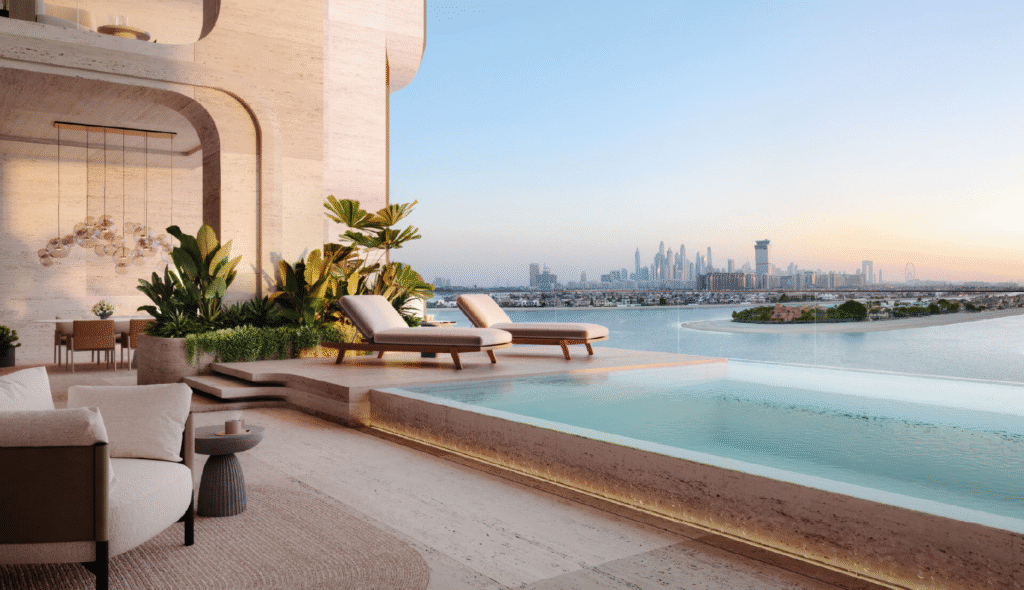
Dubai Marina is a bustling waterfront hub, offering apartments and penthouses ($600,000-$3 million) with 6-9% rental yields and 8-12% price growth. Known for its 7km canal, skyscraper skyline, and lively Marina Walk, it attracts professionals and tourists seeking urban energy. Key projects like Liv Lux feature sleek interiors, marina views, and amenities like rooftop pools and fitness hubs.
Lifestyle: Vibrant nightlife, yacht cruises, and Michelin-star dining create a dynamic atmosphere.
Investment: A $800,000 apartment yields $48,000-$64,000 tax-free, saving $17,760-$28,800. Selling for $960,000 yields a $160,000 tax-free profit, saving $32,000-$44,800. No property taxes save $8,000-$30,000, and VAT exemption saves $40,000. Maintenance fees are $8,000-$18,000, with a 5% municipality fee ($2,400-$3,200). QFZP saves $6,120-$36,000. U.S. investors deduct depreciation ($14,545-$54,545), saving up to $19,091.
Dubai Marina feels like a glamorous urban coastal escape.
Palm Jumeirah: Exclusive Serenity Meets Investment
Palm Jumeirah, the iconic palm-shaped island, offers villas and apartments ($1 million-$5 million) with 6-8% rental yields and 10-15% price growth. Known for private beaches, luxury resorts like Atlantis, and Bulgari-branded residences, it attracts high-net-worth buyers seeking exclusivity and tranquility.
Lifestyle: Private beaches, infinity pools, and serene Gulf views create a resort-like ambiance.
Investment: A $1 million apartment yields $60,000-$80,000 tax-free, saving $22,200-$36,000. Selling for $1.2 million yields a $200,000 tax-free profit, saving $40,000-$56,000. No property taxes save $10,000-$50,000, and VAT exemption saves $50,000. Maintenance fees are $12,000-$25,000, with a 5% municipality fee ($3,000-$4,000). QFZP saves $6,120-$36,000. U.S. investors deduct depreciation ($18,182-$90,909), saving up to $31,818.
Palm Jumeirah feels like a majestic coastal masterpiece.
Comparing Dubai Marina and Palm Jumeirah
Price Range: Dubai Marina ($600,000-$3 million) suits mid-range buyers; Palm Jumeirah ($1 million-$5 million) targets premium investors.
Rental Yields: Dubai Marina offers 6-9%, with short-term rentals at 10-20% ($3,600-$13,500) due to tourist demand; Palm Jumeirah offers 6-8% for stable, long-term leases.
Price Appreciation: Palm Jumeirah at 10-15% due to exclusivity; Dubai Marina at 8-12% for urban appeal.
Lifestyle: Dubai Marina is vibrant, with nightlife and dining; Palm Jumeirah is serene, with private beaches and resorts.
Amenities: Both offer smart technology and concierge services, but Dubai Marina has marina access, while Palm Jumeirah boasts private beaches.
ROI Verdict: Both deliver 8-12% ROI, with Dubai Marina favoring short-term rentals and Palm Jumeirah excelling in long-term value.
Choosing between them feels like balancing energy and elegance.
Strategies to Maximize Returns
For individuals: Hold properties personally to avoid corporate taxes, saving $6,120-$36,000. Negotiate DLD fee splits, saving $12,000-$100,000. Use gift transfers to reduce DLD to 0.125%, saving $23,250-$193,750. Recover 5% VAT on developer fees via FTA registration ($500-$1,000). Leverage double taxation treaties with 130+ countries, saving $13,320-$67,500.
U.S. investors deduct depreciation ($10,909-$90,909), saving up to $31,818. For corporates: Secure QFZP status, keep QIF income below 10%, and claim depreciation deductions. Hire property managers ($8,000-$25,000 annually) and tax professionals ($1,000-$3,000) to avoid fines up to $136,125. Focus on short-term rentals in Dubai Marina, long-term in Palm Jumeirah.
These strategies feel like a roadmap to your coastal riches.
Risks to Watch in 2025
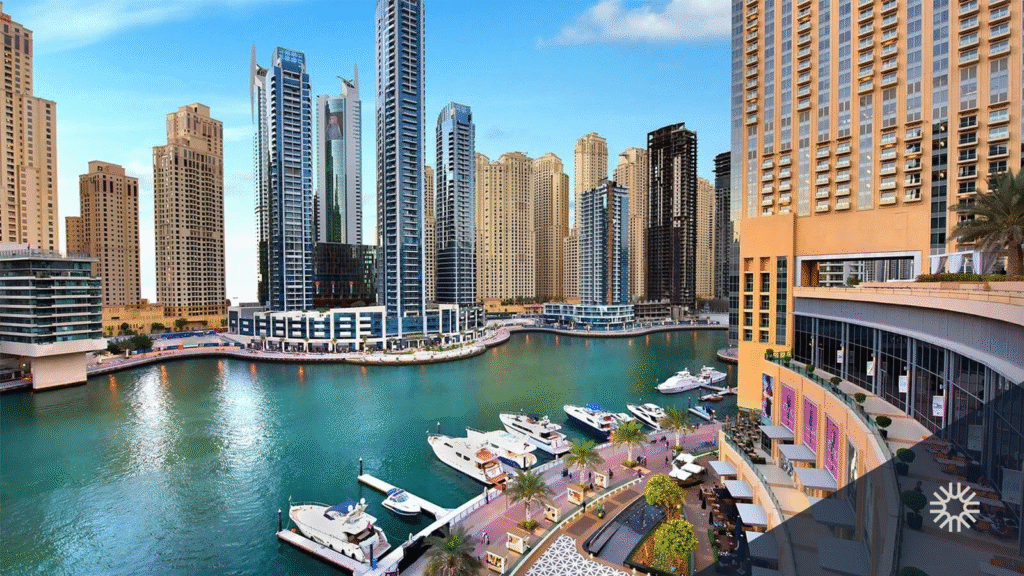
A projected oversupply of 182,000 units by 2026 may slightly slow price growth in Dubai Marina, but Palm Jumeirah’s exclusivity ensures resilience. Off-plan delays risk setbacks, so choose trusted developers like Emaar or Bulgari and verify escrow compliance via the 2025 Oqood system. Non-compliance with VAT or DTCM rules risks fines up to $13,612, and corporate tax errors can cost $136,125. Indian investors must report properties in India’s Foreign Asset schedule to avoid $135,000 penalties. Currency fluctuations, like a 5% dirham shift, could impact returns.
Why Dubai Marina and Palm Jumeirah Are Worth It
Dubai Marina’s urban vibrancy and Palm Jumeirah’s serene exclusivity offer 8-12% ROI, 8-15% growth, and tax-free savings of $6,000-$300,000 annually. With Golden Visa perks, 80-85% rental occupancy, and distinct lifestyle appeals, they cater to diverse elite investors in 2025. Navigate fees, choose your haven, and invest in Dubai’s radiant coastal future.
read more: Emerging Waterfront Districts in Dubai With Exceptional Growth Potential



